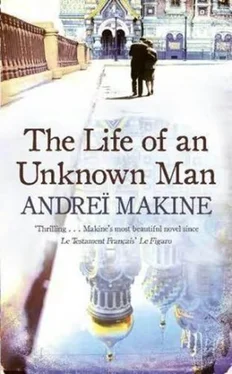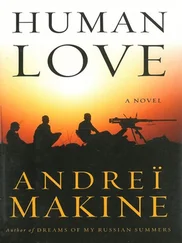Andreï Makine - The Life of an Unknown Man
Здесь есть возможность читать онлайн «Andreï Makine - The Life of an Unknown Man» весь текст электронной книги совершенно бесплатно (целиком полную версию без сокращений). В некоторых случаях можно слушать аудио, скачать через торрент в формате fb2 и присутствует краткое содержание. Жанр: Современная проза, на английском языке. Описание произведения, (предисловие) а так же отзывы посетителей доступны на портале библиотеки ЛибКат.
- Название:The Life of an Unknown Man
- Автор:
- Жанр:
- Год:неизвестен
- ISBN:нет данных
- Рейтинг книги:3 / 5. Голосов: 1
-
Избранное:Добавить в избранное
- Отзывы:
-
Ваша оценка:
- 60
- 1
- 2
- 3
- 4
- 5
The Life of an Unknown Man: краткое содержание, описание и аннотация
Предлагаем к чтению аннотацию, описание, краткое содержание или предисловие (зависит от того, что написал сам автор книги «The Life of an Unknown Man»). Если вы не нашли необходимую информацию о книге — напишите в комментариях, мы постараемся отыскать её.
The Life of an Unknown Man — читать онлайн бесплатно полную книгу (весь текст) целиком
Ниже представлен текст книги, разбитый по страницам. Система сохранения места последней прочитанной страницы, позволяет с удобством читать онлайн бесплатно книгу «The Life of an Unknown Man», без необходимости каждый раз заново искать на чём Вы остановились. Поставьте закладку, и сможете в любой момент перейти на страницу, на которой закончили чтение.
Интервал:
Закладка:
He blew furiously on the embers at the bottom of a small metal basin transformed into a stove, and threw in several strips of wood levered up from the floor. Closed his eyes. The wave of warmth had the feel of a summer’s evening… The Nord Café, the laughter of his friends, gathered there after a rehearsal. One of them amuses himself by giving voice to everything they say, in song, as in an operatic aria. A girl acquires a mustache by biting into a pastry, blushes, and Volsky, noticing that she is beautiful, blushes as well. Amid the laughter he learns her name: Mila.
He awoke hearing the high-pitched note of a stringed instrument. The sound came from the corridor of the communal apartment, from the room occupied by an old couple. These neighbors no longer got out of bed and when they needed help, one of them would scrape the strings of an old violin… He picked up the can of water that was heating on the stove, the sounds guiding him in the darkness. He told himself he must find the child and take him to the old people’s room, closer to this source of sound that could be lifesaving.
The next day as he consulted the thermometer behind its glass window (minus forty-eight), he became aware of an echo of past happiness within himself: a skating rink, fleeting silhouettes, a loudspeaker pouring forth waltzes and tangos… At present the falling of this fine red line meant only one thing: an increase in the stiffening of people’s bodies.
That morning was a milestone in the history of the besieged city. The bread ration was reduced to a hundred and twenty-five grams per person. A week before, the warehouses containing reserves of food had been bombed, and in the fire the supplies that could have fed the population of two million for a month had gone up in flames. The word “blockade” rang out now like a death sentence: the garrote of encirclement, no link with the outside world, no hope of survival. A slice of bread per day, exhaustion, immobility, nothingness. Those who could pick up Western radio stations learned of Hitler’s decision: the city, soon to be occupied, would not be emptied of its inhabitants; they would remain there, cut off from the world, without food, without water, without medical care, and, at the end of the winter, the army of the Reich would undertake “operations of sanitary maintenance,” that is to say, the destruction of two million corpses. The people of Leningrad said to themselves that this project was already under way.
Volsky ate his bread ration between bombing raids. With three other young men he had just been making his way across the roofs of several buildings where they picked up incendiary bombs, rendering them harmless with the aid of enormous steel tongs. Silence returned, he sat down behind a skylight to shelter from the wind, took out his bread, and chewed it for a long time to outwit his hunger. His gaze took in the lines of the main avenues, the spire of the Cathedral of Peter and Paul and that of the Admiralty. On the promontory of Vasilievsky Island, opposite the Winter Palace, the antiaircraft guns pointed their long barrels into the sky. Some of the monuments were hidden beneath a casing of planks as protection against shells. The Neva extended out into a broad snow-covered plain. The day was clear, blue, more beautiful than ever, thanks to the absence of traffic and crowds. A magnificent shroud, thought Volsky. Yes, a vast graveyard filled with buildings where, day after day, thousands of hearts ceased beating. No other life was possible.
The future life he had dreamed of flitted past in his mind, like a speeded-up theatrical performance: sparkling lights, operatic arias hummed to the rhythm of vaudeville chorus songs, frenzied applause… It still seemed incredibly close. And already hopeless, ludicrous.
He went back to his comrades, who were walking along the roof. Sparing movements, sluggish gestures. One might have thought that this slowness was due to fear of slipping. No, it was how people fed on a hundred and twenty-five grams of bread a day moved. Nevertheless they kept going, through the cold, through days that all presaged the end. Through the only life that remained to them, one far too much like death… One after another, they came down into the attics, then, via an iron ladder, onto the top floor of the building. On the threshold of an apartment stood a woman with a child in her arms. She greeted them with a faint smile… Volsky was astonished by the starkness of the choices imposed by war: if they had not succeeded in putting out the fire this mother and her child would not have survived… Their survival might not be of long duration, with the threat of more bombs, hunger, the plummeting of the red line in the thermometer. But this reprieve was worth the trouble of risking his life. Yes, for this woman’s wan smile, for her child’s calm breathing, one must forget that young man drinking his hot chocolate on a June evening and feeling proudly triumphant.
Since the start of the blockade he had never considered that saving a life at the cost of his own might become his destiny.
One November morning this close proximity of life to death permeated his very breathing. During the previous two days he had not had the strength to leave the apartment. At this first attempt to go and fetch his hundred and twenty-five grams of bread he had collapsed on the stairs, spent a moment before recovering consciousness, and had then taken an hour to climb back up to his room, where, thanks to the fire, his body resisted merging into the lifelessness that prevailed in the streets.
He began exploring the very last zone that precedes extinction. He had always pictured hunger as a relentless, gut-wrenching torment. And so it was, for as long as one had the strength to feel it. Then the torture came to an end for want of a victim, the latter having become a shadow for whom a mouthful of water already represented a painful effort of digestion. The cold, too, caused suffering to those who still clung to life but deadened the pain of those who were utterly exhausted and waiting for the end. Yet this increasing weakness seemed to be external to the body. It was the world that was changing, making objects too heavy (the can in which the water was heating now weighed a ton), lengthening distances (three days ago he had managed to reach the bakery: a veritable polar expedition).
Despite the physical collapse, his mind remained clear. He contemplated the possibility of no longer being alive the following day, the strangeness of confronting this notion so calmly, and even the vanity this vision of his own death would have represented, had he not really been dying.
His brain was, indeed, functioning faultlessly. And yet it was something other than thought that one evening commanded him to extricate himself from his torpid state and embark on a journey through the icy darkness that filled the apartment. At the far end of the shadows the violin strings were trembling at the touch of a hand.
The old couple were stretched out in their bed, which had the look of a tent where the sides, blankets, and jumbled-up clothes had all collapsed on top of them. No fire in the little stove, just the light of a candle that had burned low.
“My husband is dead… You passed out…,” the old woman murmured, and it took Volsky a moment to realize that the two remarks had not been made at the same time. He had had a brief blackout, the woman had got up to lay a scrap of moistened cloth on his face and, as he came to, he heard her voice (“You passed out…”). He tried to explain that it was not her telling him about the death that had thrown him to the ground, as in a bad stage play. She assured him it had not occurred to her, helped him to sit down in the armchair. They no longer had the strength to speak, their silence became a vigil in which their mutual understanding needed no words.
Читать дальшеИнтервал:
Закладка:
Похожие книги на «The Life of an Unknown Man»
Представляем Вашему вниманию похожие книги на «The Life of an Unknown Man» списком для выбора. Мы отобрали схожую по названию и смыслу литературу в надежде предоставить читателям больше вариантов отыскать новые, интересные, ещё непрочитанные произведения.
Обсуждение, отзывы о книге «The Life of an Unknown Man» и просто собственные мнения читателей. Оставьте ваши комментарии, напишите, что Вы думаете о произведении, его смысле или главных героях. Укажите что конкретно понравилось, а что нет, и почему Вы так считаете.









